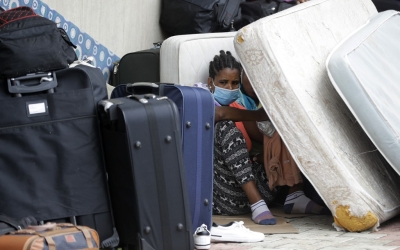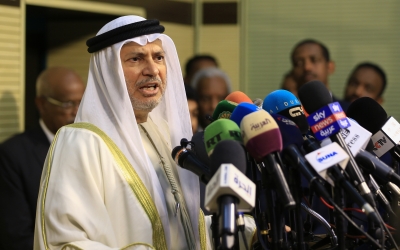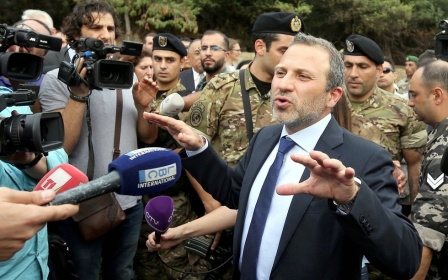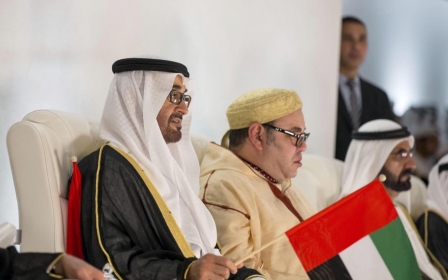Arabic press review: Syrian refugee sets himself on fire in Lebanon in protest at poor conditions

Anger in Lebanon as desperate Syrian sets fire to himself
A Syrian refugee has set himself on fire in Beirut to protest against the poor conditions he and his family have endured in the country.
Lebanese civil defence teams managed to extinguish the flames and take the man to hospital immediately, Al-Quds Al-Arabi newspaper reported.
The incident sparked a wave of anger among many Lebanese, who condemned the dreadful economic and social conditions in the country.
New MEE newsletter: Jerusalem Dispatch
Sign up to get the latest insights and analysis on Israel-Palestine, alongside Turkey Unpacked and other MEE newsletters
The United Nations High Commissioner for Refugees (UNHCR) in the Lebanese capital said that the Syrian refugee had set fire to himself near the organisation’s reception centre.
It said that the refugee was rescued by UNHCR security personnel and transferred to hospital by the civil defence teams for medical attention.
The UNHCR did not say why the man set himself ablaze, but a spokesman for Lebanon's Internal Security Forces (ISF) said that it was because he could not afford medical treatment for his sick daughter.
The spokesman said the man, who was being treated at the nearby Rafic Hariri hospital, was in a stable condition.
The incident occurred at the same time as the discovery of thousands of tonnes of rotten flour, which had been sent to Lebanon as aid by Iraq. Instead of the flour being distributed to poor and needy families, it had rotted due to improper storage conditions, according to Al-Quds Al-Arabi.
The newspaper reported that lawyers have filed a complaint with the Public Prosecution against a number of ministers, directors, employees and officials on charges of "negligence of duty and the causing of the destruction of thousands of tonnes of Iraqi flour".
Israeli companies head to UAE for business deals
Israeli companies have started to actively market their products and goods in the UAE, in order to benefit from the normalisation agreement between the two countries that enables economic cooperation and commercial exchanges.
According to the Palestinian Ma'an news agency, an Israeli delegation arrived in Dubai last week on a private plane, and met with Emirati businessmen and government officials.
The delegation included a former official in Mossad, who has now become a businessman and botanist with experience in desert crops.
He had previously visited the UAE before the announcement of the normalisation deal, and had worked behind the scenes to strengthen relations between the two parties, the agency reported.
Ma'an indicated that representatives of Israeli companies had held private meetings with potential partners and toured Dubai during the visit.
The agency quoted Mohamad Mandeel, chief operating officer of Abu Dhabi’s Royal Strategic Partners Initiative, as stating that high-protein chickpeas manufactured by the Israeli company InnovoPro was one of the products that could be manufactured at regional level.
Mandeel said that "the economy will lead", noting that "politics revives the economy, and then everything goes in a positive direction", according to Ma'an.
UAE birth rate falls
The decline in women's fertility and birth rates in the UAE has become a source of concern for the government and might threaten the country's development programmes, according to a report published in Al-Bayan newspaper.
According to the publication, Emirati women have fewer births than non-Emiratis based in the country.
The fertility rate of Emirati women in the UAE decreased from 4.4 per woman of reproductive age in 1990 to 1.75 in 2010, according to a report published by the World Bank in 2012. The rate continued to decline, reaching 1.17 in 2016, said Al-Bayan.
Setting a 50-year plan to address the issue has become a necessity, as increasing birth rates are a pillar of sustainable development in the UAE, the newspaper said.
The publication recommended the creation of housing, educational and healthcare programmes to encourage childbirth, in a way that ensures a demographic balance that keeps pace with the general population growth in the UAE.
Nearly 1.5 million Moroccans unemployed
The number of unemployed Moroccans jumped to 1.48 million in the third quarter of this year, as the unemployment rate reached 12.7 percent, due to the repercussions of the coronavirus pandemic and the drought the country has experienced, the New Arab newspaper reported.
The latest figures revealed that 368,000 people had been added to the total number of unemployed in the third quarter of 2020.
The unemployment rate in cities was recorded as 16.5 percent, and 6.8 percent in rural areas. In the same period last year, the national unemployment rate stood at 9.4 percent.
Middle East Eye delivers independent and unrivalled coverage and analysis of the Middle East, North Africa and beyond. To learn more about republishing this content and the associated fees, please fill out this form. More about MEE can be found here.






